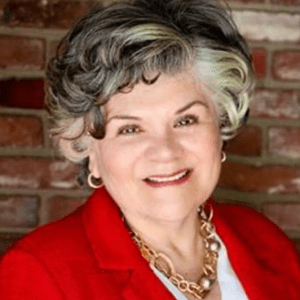Martha Escutia

by Ray Delgado
The class that changed Martha Escutia’s life was at Georgetown Law School in the late 1970s, where she was enrolled as the first and only Latina at the school. She was taking a class in constitutional law and civil liberties and sided with a conservative minority in a case, much to the surprise of her professor, Robert Drinan, who was a Jesuit priest, lawyer, human rights activist, and Democratic U.S. Representative from Massachusetts.
“After the class was over, he literally found me at my next class, asked me to come out of the class and talk to him,” said Escutia, who now serves as USC’s Vice President for State Government Relations and Special Counsel. “He basically told me that I had a responsibility to my community. And it stayed with me.”
Escutia went on to devote her career to activism and community representation as a lawyer and politician, representing the 30th District in the state senate for 14 years, where she advocated for issues like affordable auto insurance for low-income drivers, limits on junk food in school cafeterias and a state-mandated study examining air pollution’s impact on children’s health. She also held many leadership roles in her political career as the first woman and Latina to chair both the Assembly and Senate Judiciary Committees and the first woman Chair of the 27-member California Legislative Latino Caucus.
Having grown up in a disadvantaged community in East Los Angeles and being the first in her family to attend college when she enrolled at USC, Escutia recognized her responsibility to be a role model to others and to create pathways for others to lead.
“I do see myself as a role model, and yes, many people see me, unfortunately, as the exception to the rule, but I don’t want to be the exception. I want to be the rule,” Escutia said.
“Our community really hasn’t advanced as much as we would like to think we have, especially if you’re a woman and a woman of color. We don’t have a glass ceiling, we have a concrete ceiling. It’s tough because we have to deal with issues of gender discrimination, as well as racial and ethnic discrimination.”
Escutia was recruited to help USC in community and government relations in 2013. As Vice President for State Government Relations and Special Counsel, she provides strategic advice and guidance on many of the issues she’s championed throughout her career. She’s also a lecturer at USC’s Gould School of Law.
Escutia is well-versed in Title IX’s role and importance at USC, most recently because she led a coalition in opposition to a senate bill which would have resulted in revenue cuts to women’s and non-revenue-generating sports. Escutia saw the bill as a clear violation of Title IX and eventually convinced the Women’s Legislative Caucus to halt it. Unfortunately, it’s likely to come back next year and Escutia is preparing for the fight.
“I’m talking to my Title IX experts, because these legislators don’t really have time to steep themselves in the details. We basically have to really narrow them down into very fast, common talking points that anyone can understand. To support this kind of a bill that not only violates Title IX by basically, in my opinion, decimating women’s sports, and decimating your non-revenue-generating sports, and decimating Olympic sports, it was like, how can you do this on the eve of the 2028 Olympics in LA? It just does not make any political sense.”
Despite the challenges, Escutia is proud to work for a university that takes Title IX seriously and helps provide opportunities for disadvantaged communities. “I’m just frankly very, very proud of USC for even doing this, for honoring the 50th anniversary,” Escutia said. “It really caught me by surprise. So it just makes me very proud as a staff member to be associated with an institution that takes us very seriously. I would say women, especially women of color, we need all the help we can get. We need all the help we can get from legal statutes that basically help us to just get through the door. Because once we get through the door, we can perform.”